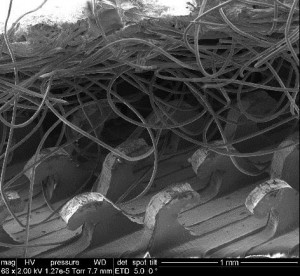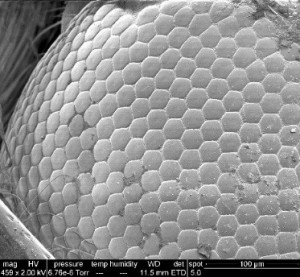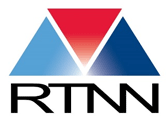Click to jump to the corresponding section:
| K-12 Teachers & Students | Nanotechnology: A Maker’s Course | New and Non-Traditional Researchers |
| Community College Educators & Students | Undergraduate and Graduate Students | Professional Researchers |
For K-12 Teachers & Students
Classroom Learning & Field Trips
Bring university research facilities into your classrooms via remote connection (as free complement to your K-12 curriculum!) or bring your students to an RTNN facility for in-person, interactive demonstrations.
A major focus of the RTNN is to bring nanotechnology awareness and experiences into middle schools and high schools. Through the RTNN, we will be able to offer you FREE access to equipment such as scanning electron microscopes (SEMs) that can image objects at the nanoscale.
There are numerous ways to interact with us for FREE:
Monster Under the Bed: Send a sample to us (e.g. dust from under your bed – there will be mite monsters), and we will image the sample in the SEM in a real time Skype link with your class.
Seat Belts Everyone! Field Trip: Visit our RTNN labs and observe our equipment in action. Maybe your class collects a few bugs, rocks, or plants they are interested in looking at.
School Days: Use scotch tape to collect samples from around your school by sticking it to surfaces and seeing what it collects.
Send your samples to us in advance. On the day of your virtual skype or in-person visit, a graduate student staff member at one of our universities will connect with your class via Skype or in-person. They will talk with your class about the equipment being used, what it’s typically used for, and then will image the sample(s) that your class sent to us. Your students will see the equipment, how the imaging SEM system works, get to see their samples up close, and start making discoveries of their own.
If you’re interested in bringing this technology into your classroom, contact us at rtnanonetwork@ncsu.edu. Click for a print advertisement of our K-12 opportunities.

Microscopic image of typical velcro

Close up of a bug eye
View a video recording of one of our web-based demonstrations, courtesy of teacher Andrew Gatt of Orange Charter School in Hillsborough, NC.
Take-out Science
Take-out Science is a program designed to provide you with “take-out” access to our nanotechnology tools and experts during the coronavirus pandemic. Every Tuesday at noon (ET), we stream a new show in real time focused on a different theme. Please visit the Take-Out Science page to learn more.
Sciencing with Abby
In the Sciencing with Abby video series, kids (and adults) are invited to conduct science experiments with us using supplies they can find at home. Each experiment has two levels: beginner videos are aimed at Kindergarten – 5th grade audiences and advanced at 6th -12th grade. Please visit the Sciencing with Abby page to learn more.
LeSSon Plans
RTNN has also worked with educators to develop nano-themed lesson plans for K-12 students that utilize a variety of facility tools. Please visit the Lesson Plans page to learn more.
IMMersive Lab experiences
The RTNN has also created immersive lab experiences for K-12 students in an effort to give students engaging, hands-on activities in our facilities. In this program, students come to the facilities and work alongside other users. To prepare for the visit, the activities include work outside the facilities including watching videos, collecting samples to image, and designing a photomask. In the facilities, students operate the equipment and take ownership of the work. Please visit the Immersive Lab Experiences page to learn more.
RESEARCH EXPERIENCE FOR TEACHERS (RET)
The RTNN is accepting applications for its 2022 summer RET program on Atomic Scale Design and Engineering. Educators will participate in team research in nanotechnology labs and receive a $5,000 stipend. Applications will be considered until all positions are filled. Visit the RET Page for more information.
RTNN Kickstarter program
In order to further our mission to serve as a hub of cutting-edge nanotechnology innovation and education, the RTNN has established the Kickstarter Program to allow members of the nanotechnology and greater scientific communities, who would otherwise not have the financial resources, to use RTNN facilities. Among the targeted audiences for this funding are high school and community college science and engineering students and educators.
Examples of relevant educational programming include:
- Individual or group class projects that utilize RTNN capabilities.
- Lesson plan development featuring examples from experiments run at RTNN.
- Innovative field trip experiences.
Visit our Kickstarter Program page for more information. Click to view the application.
Nanotechnology: A Maker’s Course
The RTNN developed a free online course to give an overview of nanotechnology tools and techniques and demonstrate equipment within RTNN facilities. The goal of the course is to introduce nanotechnology concepts to students and give them a better sense of the nanotechnology tools’ capabilities. The course targets learners who have a high school or higher science background and limited exposure to nanotechnology facilities. The course is hosted on Coursera and is open to students from around the globe. To learn more or enroll visit the course homepage.
For New and Non-Traditional Researchers
The RTNN offers many resources for researchers who are new to nanotechnology facilities or who are coming from non-traditional research areas. We would be happy to talk about your needs via email or telephone – just send us a quick note at rtnanonetwork@ncsu.edu to get started!
RTNN Kickstarter program
In order to further our mission to serve as a hub of cutting-edge nanotechnology innovation and education, the RTNN has established a Kickstarter Program to allow members of the nanotechnology and greater scientific communities, who would otherwise not have the financial resources, to use RTNN facilities.
The RTNN encourages applications from high school and community college science and engineering students and educators, non-traditional users (those from disciplines that have not historically used NNCI programs, including Biology, Biomedical Engineering, Textile Engineering, Environmental Engineering, Agriculture, Soil Science, Forest Biomaterials, and Plant & Microbial Biology), users from underrepresented groups (as defined by NSF), academic users who are at a non-Research-1 university and may have limited access to facilities and/or research funding, and industrial users who for some reason do not have funds or have start-up projects with highly innovative potential.
Examples of relevant research and development activities include:
- Preliminary data collection, prototyping, or proof-of-principle studies with prospects of leading to future outside funding or investment.
- Activity that expands the scope of the applicant’s existing research programs.
- Specialized characterization or fabrication not currently funded within the scope of the applicant’s existing programs.
Visit our Kickstarter Program page for more information. Click to view the application.
For Community College Educators & Students
Summer Nanotechnology Workshop
The RTNN hosts a 2-day summer nanotechnology workshop for Community College educators. Details for the 2022 event will be posted when available. Participant support funds are available to defray the costs of travel and daycare. Visit the workshop website to learn more about this exciting event.
RTNN Kickstarter program
In order to further our mission to serve as a hub of cutting-edge nanotechnology innovation and education, the RTNN established the Kickstarter Program to allow members of the nanotechnology and greater scientific communities, who would otherwise not have the financial resources, to use RTNN facilities. Among the targeted audiences for this funding are high school and community college science and engineering students and educators.
Examples of relevant educational programming include:
- Individual or group class projects that utilize RTNN capabilities.
- Lesson plan development featuring examples from experiments run at RTNN.
- Innovative field trip experiences.
Visit our Kickstarter Program page for more information. Click to view the application.
For Undergraduate and Graduate Students
Research Experience for Undergraduates (REU)
The Research Triangle – Research Experience for Undergraduates (REU) program is focused on hybrid perovskite materials. Students participate in ten weeks of research at one of the RTNN partner universities. Visit the REU page for more information and applications.
Peer-to-Peer Networking Distance Use Program
Our peer-to-peer network enables undergraduate and graduate students from other locations to access facilities in the RTNN remotely. Graduate student staff at all of our facilities are ready to help you with fabricating or characterizing your samples. Staff will interact with you via video-based communications (Skype, WebEx, etc.), and samples will be exchanged via mail. While we strongly encourage you to visit our facilities for the first usage (you can learn a lot on-site!), we understand that travel costs and time are often huge challenges to accomplishing research. Let us help! Get started by emailing rtnanonetwork@ncsu.edu.
Scientific Art Competition
RTNN partners with Chapel Hill Analytical and Nanofabrication Laboratory (CHANL), an RTNN member facility, and the UNC Art Department for their annual Scientific Art Competition! The Scientific Art Competition provides an opportunity to showcase scientific data with artistic appeal. Submissions will be displayed at an awards reception, and cash prizes will be awarded to the winning submissions. Details for the 2022 competition will be posted here when available.
Professional Researchers
Technique Training Workshops
The RTNN offers regular training and specialized process workshops that target professionals. For a listing of upcoming workshops hosted by RTNN and our member facilities, visit our Events page.
Have an idea for a workshop topic? Email us at rtnanonetwork@ncsu.edu! Let us help!

